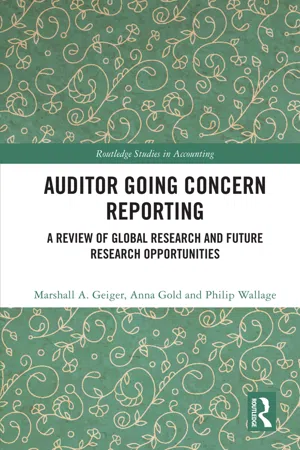
Auditor Going Concern Reporting
A Review of Global Research and Future Research Opportunities
- 168 pages
- English
- ePUB (mobile friendly)
- Available on iOS & Android
Auditor Going Concern Reporting
A Review of Global Research and Future Research Opportunities
About This Book
Auditor reporting on going-concern-related uncertainties remains one of the most challenging issues faced by external auditors. Business owners, market participants and audit regulators want an early warning of impending business failure. However, companies typically do not welcome audit opinions indicating uncertainty regarding their future viability. Thus, the auditor's decision to issue a "going concern opinion" (GCO) is a complex and multi-layered one, facing a great deal of tension. Given such a rich context, academic researchers have examined many facets related to an auditor's decision to issue a GCO. This monograph reviews and synthesizes 182 recent GCO studies that have appeared since the last significant review published in 2013 through the end of 2019.
The authors categorize studies into the three broad areas of GCO: (1) determinants, (2) accuracy and (3) consequences. As an integral part of their synthesis, they summarize the details of each study in several user-friendly tables. After discussing and synthesizing the research, they present a discussion of opportunities for future research, including issues created or exacerbated as a result of the global COVID-19 pandemic.
This monograph will be of assistance to researchers interested in exploring this area of auditor responsibility. It will also be of interest to auditing firms and individual practitioners wanting to learn what academic research has examined and found regarding this challenging aspect of audit practice. Auditing standard-setters and regulators will find it of interest as the authors review numerous studies examining issues related to audit policy and regulation, and their effects on GCO decisions. The examination of GCO research is extremely timely given the financial and business disruption caused by the worldwide COVID-19 pandemic. This unprecedented global event has caused companies, auditors and professional bodies to revisit and reassess their approach to going concern, and to think even more deeply about this fundamental business imperative.
Frequently asked questions
Part I
1Introduction and overview

Table of contents
- Cover
- Half Title
- Series Information
- Title Page
- Copyright Page
- Dedication
- Contents
- List of illustrations
- Acknowledgments
- List of abbreviations
- About the authors
- Part I
- Part II
- Part III
- Part IV
- Index